The Escape
Medieval Tale by Maurilio Lovatti
It had snowed heavily on that cold Christmas of 1354. It had started on Christmas Eve afternoon throughout the Varaita Valley, with small, sparse flakes, but then during the night the snow had fallen heavily on the houses, the woods, and the mountains and had not stopped for three days.
It was almost dark when Eligio reached the hut. He had to dig with his hands, half-frozen despite his rudimentary cloth gloves. It took him almost a quarter of an hour to open the massive wooden door. Once inside, he frantically lit the fire: he was shaking like a leaf and feared he wouldn't make it. Now he could rest easy: the hut was in a hollow, and from the houses of Sant'Eusebio it was impossible to see the smoke. He had known that refuge since he was a child, and his mother, in the warmer months, sent him to help the Count's shepherds. He knew that by leaving Pontechianale early in the morning, he would arrive before nightfall.
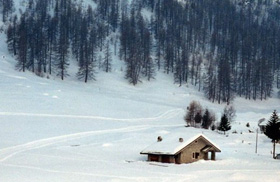
He laid out his soaking, freezing clothes to dry by the fire. In the chest were dried beans and broad beans, salted meat, and a piece of aged cheese. He would rest a day and two nights before attempting the feat: skirting the great mountain, he could reach Prazzo in the Maira Valley, where he would find hospitality among the farmers. In the evenings, in the stables, their elders still proudly recounted the incredible story of Bianca Lancia and Emperor Frederick II, and they hadn't forgotten the good old days when the Maira Valley still belonged to the Marquises of Busca. If he could reach Cuneo, avoiding Dronero, he would be safe. The city was garrisoned by Visconti soldiers, and no one would hand him over to the hated Marquis of Saluzzo, Thomas II, or to his vassal Count. At table, while serving, he had overheard Thomas II, galvanized by his alliance with the Marquis of Montferrat, explaining to the Count his plans for the conquest of Cuneo; but he had nothing to fear. Nothing would change before the end of winter.
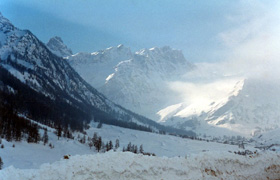
His skill as a chef had led him to work in the castle kitchens, and he often served at table when the Count hosted distinguished guests. It was said that no one was better than him at cooking golden porchetta and preparing partridge stuffing. But his specialty was quail roasted on a hot stone and spiced Barbera. Even Galeazzo II had requested two barrels from the Count for his wedding banquet with Bianca of Savoy. When the Marquis's vassals had drunk too much, they spoke without restraint, and he, without being noticed, was extremely attentive...

Lying on the straw mattress, exhausted, he couldn't sleep. The silence was total, broken only by the crackling of the fire: memories of his first nights spent in the pasture came flooding back, the dogs barking in the distance, the wind whistling, the suffocating fear of the first time he slept away from his mother, whom he wouldn't see again for weeks. He tossed and turned on the straw mattress, and every now and then he touched the leather bag beside him, wanting to be sure it was really there: his entire future depended on that bag.
In two days, everything would be up for grabs: he knew it would take at least eleven hours of sustained marching, and at that time of year, daylight lasted only nine hours. He would have to leave two hours before dawn; with his resin-soaked torch, he could orient himself in those places he knew perfectly, but he absolutely had to reach Prazzo before nightfall or he would freeze to death.
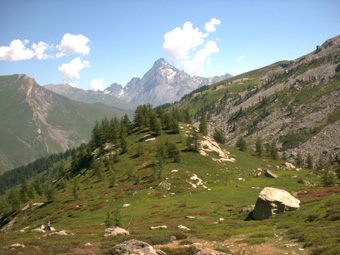
Any small
mistake or unexpected event would have been fatal. To overcome his fear,
he indulged in his imagination: he imagined himself rich and respected, in
a beautiful house with a garden, like a wealthy retired merchant. He would
go to live in Liguria: the Republic of Genoa was now under the rule of the
Visconti family, and there he would be safe. And then he would finally see
the sea: none of the inhabitants of those valleys had ever seen the sea.
On long winter evenings, during fireside chats, they recounted tales of
Provenšal merchants who traveled up the valley to sell clothes and
precious fabrics to the lords, and the sea was described as an upside-down
sky and the waves like collapsing walls of water: he tried hard, but he
couldn't imagine it, the sea... A playful future awaited him, filled with
sun, warmth, and outdoor life, free from the snow and cold of his
mountains.
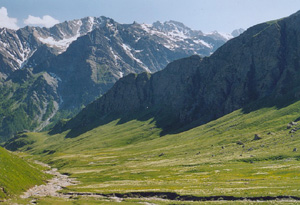
It all began almost by chance. One summer night, a long, daydreaming stroll through the castle courtyard. He'd seen the young Countess Beatrice with Ermanno, the son of one of the valley's richest merchants. She was terrified: she didn't dare think what would happen if her father discovered them. He watched her open a small door and lead him up a spiral staircase he hadn't known existed. Carved into the stone wall was a small opening, sealed off by a marble slab. Beatrice needed the staircase to reach her rooms without being seen. But in a few months, with patience, he'd discovered how to open the little secret closet. But that had been just a lucky break. It alone wouldn't have been enough to give him the courage.
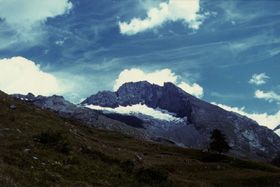
If
only Emma hadn't treated him like this... The images of summer came back
to him with painful clarity. It was a clear day in late August, and the
Sant'Eusebio fair was crowded and noisy. For the feast of St. Bartholomew,
merchants came from the villages in the valley, from Venasca and Rossana,
and some even from Saluzzo or Busca. At the tavern in the square, the men
sat outside chatting, drinking wine, and gazing at the girls. He was left
breathless when he saw her pass by, in her white Sunday dress, her hair
tied with a red ribbon. The mountain shone in the setting sun, and he
seemed to still smell the roasting meat and the music and singing in the
distance. He had thought about her and dreamed about her for months.
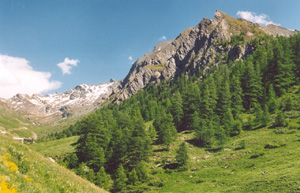
It hadn't been easy for him to find the courage to approach her. He had prayed long and hard to St. Bartholomew in the castle chapel and hoped for her help. But she was quick and decisive in dashing all hope. In her eyes, he saw contempt for his status as a servant and the polite haughtiness of someone with far greater hopes. He wanted to be completely honest with himself: perhaps that hadn't been the straw that broke the camel's back. Anger toward the count had exploded within him when his mother, before dying, had recounted to him the terrible years of her youth. Her tone was resigned and almost serene, she seemed ready to forgive, but he read the signs of deep pain and torment in it. She was not yet fifteen, and she had already earned the trust of Teresa, the Countess Dowager's personal maid. She always helped her, sometimes replaced her, and spent much of the day in the old Countess's chambers. One day, the Count lingered for a long time, watching her as she dressed the Countess. It was on a whim that he used a pretext to order her to his chambers. He took her to his four-poster bed, without a shred of kindness, as if it were his right. For almost a year, at the most unexpected hours of the day and night, he sent for her; sometimes, dead drunk, he dozed off beside her, barely touching her.
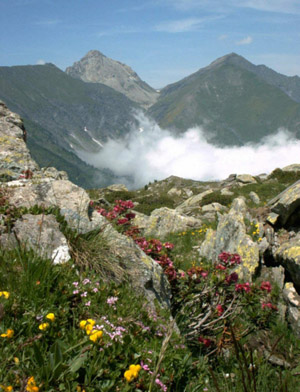
After a few months, the Count began to lose interest in her, then suddenly ordered her to marry an officer of the guards: her father, whom Eligio didn't even remember, except in his mother's stories, and who had died in 1312 during the Angevin siege of Saluzzo, having remained loyal to Emperor Henry VII. By now, there was no point in dwelling on memories. He had only to think about not making mistakes, or it would be the end. He carried with him a large tallow candle, with a clearly visible notch: if lit at sunset, the flame would reach the mark two hours before dawn. After resting a full day to regain his strength, he lit the candle just as a pale light was fading beside the glaciers of Monviso.
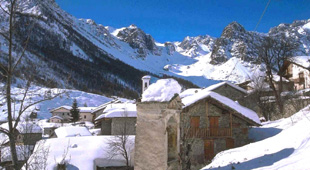
During the night he woke suddenly: he was shaking, sweating, struggling to breathe, his throat felt parched. He realized he had a high fever. He was gripped by terror. He didn't want to die there, alone like a dog, and right now: he touched the bag bulging with coins and jewels, as if to make sure it wasn't all a nightmare. When he tried to get up, he realized he was very weak. He shouldn't panic: if he could keep the fire going, maybe he could still make it. He didn't know how many days he remained in a semi-conscious state, with the waterskin beside him, drinking greedily every time he woke. He dreamed of Emma smiling, in a white house with a garden, shining in the sun; there was so much light and so much warmth...

Finally, his fever passed. He began to eat and regain his strength. He had to hurry; with each passing day, the risk of being discovered increased. When he felt ready to take the risk, he lit a second tallow candle at sunset, on which he had marked it. He left the hut two hours before dawn. In the pitch darkness, his flashlight cast faint glows across a deserted, ghostly landscape. The mule track was invisible under the snow, but he was right: he knew every tree and rock on that slope. He reached the first pass when the light of dawn was barely visible, just as he had predicted. He threw away the flashlight, because the resin was now almost completely consumed. He felt weak and tired, but the possibility of making it gave him unexpected strength. He marched all day, nonstop, his legs sinking knee-deep in snow. The trail was only glimpsed in patches, but he managed to stay halfway up the slope, with the summit always to his right. Only in mid-afternoon did he begin to see Prazzo, far away down the valley. He realized he wouldn't arrive before dark. His feet felt cold and numb. He wouldn't survive a night in the snow. He quickly made his decision: he left the trail and began descending the steep slope, and after an hour he was already beside the pine forest. He was exhausted, but with another two hours of steep descent he would arrive in time.
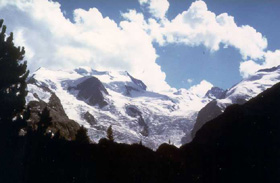
It happened suddenly: a dull thud behind him, and the avalanche hit the forest. He was right at the edge. A mass of snow covered him. He felt a sharp pain in his leg. With his arms, he managed to push some snow aside to breathe. His leg was stuck under a log dragged by the avalanche. No matter how hard he fought, he couldn't free himself and instead sank deeper into the snow. He fought like a madman, but it was all in vain. Night fell, he felt his limbs growing numb from the frostbite, he was shivering, but he refused to give up.
He didn't want to think about his death, even though deep down he felt he deserved it: a servant couldn't think of changing his condition like that. The cold was now gripping every part of him. He fantasized and dreamed of the sea he would never see: he saw the sky upside down and heard the sound of the water, familiar as the waterfalls of the stream, and it seemed sweet to let himself be carried into the nothingness by that current of warm water. He saw his mother's reassuring smile once again. The last sound he heard was that of the bells of Prazzo ringing in celebration.
It was the morning of January 6, 1355, the Epiphany of the Lord.

Maurilio Lovatti An Unforgettable Trip. Giambattista Tiepolo in Verolanuova (Brescia) (historical tale about Tiepolo)